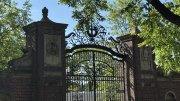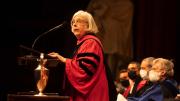Speaking at the February 1 Faculty of Arts and Sciences meeting—two years to the day from the detection of the first Massachusetts case of COVID-19—Dr. Giang Nguyen, executive director of the University Health Services, disclosed an astonishing fact about Harvard’s viral testing. The median turnaround time for PCR tests—logging into the system, entering the barcode for one’s sample-collection tube, swabbing, dropping it off at a campus collection point, pickup, laboratory processing, and reporting the result—was 9.7 hours.
Obviously, the University mustered its ample resources to make timely, universal testing a reality within the community (as it never was in the United States at large). That was a major factor in identifying and isolating infected individuals and their contacts, thus controlling the spread of disease: sterling efficiency that was hugely productive for the University, enabling a residential teaching and research institution to get about its work—an unqualified success.
Crisis responses aside, the pandemic experience has midwived other changes in Harvard’s practices and culture: no small thing in a sprawling, tradition-bound institution. But in some cases, the gains in efficiency come at a cost to other values that members of the community have held dear. Those merit at least some consideration as doors swing shut.
Approaching this most unconventional Commencement season (the regular rigmarole for the class of 2022 on May 26, plus a makeup fête for the graduates of 2020 and 2021 on May 29), the University is debuting Harvard Alumni Day on June 3. What had been the Harvard Alumni Association annual meeting “afternoon exercises” in the pre-pandemic era was suspended in 2020, and reconceived as a separate online event last year (see harvardmag.com/comm-kevin-young-21). Now, under a new name and its own multicolored Harvard shield, the morning exercises are Commencement (focused on graduates, with song, conferring of degrees, and a guest speaker’s address) and the afternoon exercises are transmogrified into the separate, subsequent event (focused on alumni and reunions, with remarks from the head of the alumni association and the president, and a separate headline speaker).
The logic for such a change is impeccable. It has never made good sense to force the graduation speaker to wait out the afternoon, hoping the weather holds and the dispersed morning crowds reconvene, before addressing what is no longer a graduation event.
Moreover, it is eminently practical: the number of degrees conferred has risen a lot of late (from 7,415 in 2010-2011, to 8,373 in 2018-2019, and 9,431 in 2019-2020, when Extension School certificates were added to the tally). That reflects burgeoning Extension enrollment and professional-school master’s degree programs, and implies ever-larger student cohorts and throngs of family members clamoring to attend. Moreover, graduates are living longer—who ever expected seventieth College reunions—and affluence, strengthened social ties, and ease of travel all encourage attendance. These trends have become too much of a good thing to accommodate readily, even within the capacious Tercentenary Theatre.
But there is a cost, of a different sort. Commencement is a beginning. Students’ years of study yield to subsequent careers—though graduates remain grounded, in some way, in their experience of learning at Harvard. There was something remarkable about encountering that in actual alumni—emerged from the chrysalis but retaining a crimson hue—who demonstrated their ties to the University and each other by showing up for their coterminous reunions. They, in turn, got to see the young, in whom so many have invested their hopes (and other resources), live, in real time: in effect, kicking the tires on the future.
The University has been distinctive in jamming all these people and relationships together in the one overscaled extravaganza of Commencement day. Sure, it was crowded and ambitious—but Harvard has always wanted to be ambitious, about everything.
Now, Emerson’s “long winding train reaching back into eternity” has pulled out of the station for the last time. No big surprise: the era of train travel itself is long gone. The alumni will still parade on their day, but the new graduates won’t be on hand to witness them. (In an age of Facebook and Zoom, maybe nobody would have been looking up from their screens to watch.) From this year, the University has formally moved on from a tradition that was, perhaps nuttily but proudly, its own. The case for reducing hassles was strong. But mixing graduates and alumni together produced affections and affiliations that are, henceforth, forgone.
Another change looms, again for efficiency’s sake—but this time, impinging on intellectual productivity in a broader sense. As reported, the College seems certain to replace “shopping week,” the beginning-of-term scrum when undergraduates sample classes before registering for them, with a system of “previous-term registration”—presumably April for fall courses, and November for spring ones (News Briefs, March-April, page 22). The faculty’s first formal discussion of the proposal took place March 1, with a vote likely sometime this spring.
The advantages are many: matching teaching assistants to enrollments (a matter of genuine importance to graduate students), fitting classes to classrooms, not wasting the first week of instruction. The committee proposing the new system also urges a liberalized first-week add-drop procedure; an “earlier cycle for curricular planning”; better advising; and better enrollment technology—collectively worthwhile, but not easy to effect. If everything gels, the whole process would assuredly be less chaotic, and real pedagogical benefits would accrue (if not necessarily all to undergraduates, who oppose the change).
What is lost is serendipity. Students in the College can graze among thousands of courses: a smorgasbord on offer in very few other places, if any. The point of laying out this dazzling, costly buffet is not to show off the faculty’s intellectual breadth: they already do that in their resesarch and academic writing. It is to let the students privileged to study at Harvard indulge in the professors’ teaching to the fullest. Lots of students matriculate thinking they want to be doctors or computer scientists; lots more get lured to the lucrative consulting and investment-banking tracks. Their studies will no doubt serve them well.
But one point of the Harvard course catalog is to provide opportunities for purposeful youngsters to broaden themselves. Perhaps most won’t. But some have—while indulging a curiosity or a whim, or following a friend’s advice during shopping week. Previous-term registration undercuts the odds of that occurring, maybe by a lot.
Again, the efficiency gains are undeniable. But they surely come at some cost to Harvard’s historic commitment to a broader definition of intellectual and academic productivity: hard to quantify, to be sure, but now less valued in a real sense.
—John S. Rosenberg, Editor








